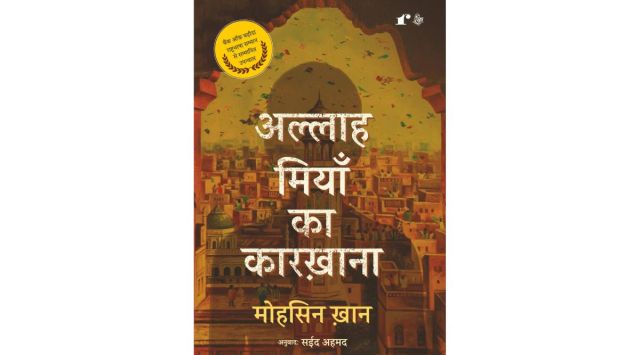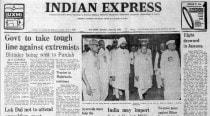An Urdu novel shows us a mirror – we punish the innocence out of our children
Mohsin Khan's 'Allah Miyan Ka Karkhana' is a moving depiction of childhood miseries that lays bare the truth of disproportionate criminalisation and arbitrary punishment.
 Khan lays bare the various shadowy aspects of our “civilised” and “humane” society where the innocent playfulness of children, insignificant adolescent moral deviations and adherence/non-adherence to religious practices are all severely penalised. (Image source: Rekhta Book)
Khan lays bare the various shadowy aspects of our “civilised” and “humane” society where the innocent playfulness of children, insignificant adolescent moral deviations and adherence/non-adherence to religious practices are all severely penalised. (Image source: Rekhta Book) This year, both the JCB Award for Literature (English translation) and the Bank of Baroda Rashtra Bhasha Samman Award (Hindi translation) have been bagged by celebrated Urdu novelists. Khalid Jawed won the JCB Award for his novel The Paradise of Food which was translated from Urdu to English by Baran Farooqi. Mohsin Khan won the inaugural Bank of Baroda Rashtrabhasha Samman award for his novel Allah Miyan Ka Karkhana, into Hindi by Saeed Ahmed. It is heartening to see two Urdu novels — that subvert the notion of Urdu poetry’s reliance on themes of unrequited love and longing for spiritual sublimity — finding resonance with readers across languages. Geetanjali Shree, International Booker award-winning author, headed the jury of the BOB Bhasha Samman award, which carries a cash prize of 21 lakh. She announced that Mohsin Khan’s novel was chosen from a longlist of 12 Odia, Punjabi, Bengali, Marathi, Tamil, Nepali and Urdu novels.
Khan’s novel produces a poignant narrative from the perspective of a nine-year-old lower-middle-class boy, Jibran, who falls victim to a world that constantly spurns and punishes him. All the people he interacts with, from his family to his mentor and even a shopkeeper, punish him far too harshly for his follies.
Khan lays bare the various shadowy aspects of our “civilised” and “humane” society where the innocent playfulness of children, insignificant adolescent moral deviations and adherence/non-adherence to religious practices are all severely penalised. Violence and intolerance surface everywhere. Khan’s novel reminds one of Shakespeare’s pithy observations about London, which could be applied to any big city, “London is a non-stop theatre of punishment”.
The novel, through a moving depiction of childhood miseries in a sleepy town, makes it clear that disproportionate and arbitrary punishment betray a hostility towards those with different religious beliefs and allows the powerful to retain dominance. It is a heartwrenching narrative of the terrible effects of discrimination and injustice, under the guise of justice.
Khan discusses how the justice system reflects the views of the powerful and draws from religious beliefs, sectarian laws, social convictions, cultural practices and moral values. The self-interest of the powerful is accepted without question. Even as certain religious, political and ideological leanings are criticised by writers and poets, the prosecution system escapes unscathed.
Franz Kafka’s Before the Law and The Trial narrate how the judicial system lacks a sense of proportion between crime and punishment. Trivial crimes fetch stringent punishment, and the media and people gradually become arbiters of justice in society. Allah Mian Ka Karkhana, which has gone into three print editions, is perhaps the first Urdu novel that zeroes in on all possible emotional overtones of gradually coming to conform to such a capricious system. Jibran’s story is a nuanced tale of a human predicament. Jibran and his younger sister Nusrat seek to comprehend how opposing elements shape our universe and why one thing is pitted against the other in divine creation. Jibran asks: “Allah Miyan ne murghi banai thi to billi kyun banai?” (Why did God create a cat after a hen?) Similarly, why is punishment not in proportion to the crime?
When Jibran purchases sugar, the shopkeeper gives it in a paper bag that carries a risque picture of a young girl. Jibran, having no means of entertainment, preserves the paper bag. When he feels down, he looks at it. He has lost his parents and lives in his uncle’s house in a rickety room. While he is looking at the picture, his aunt barges into the room. She is infuriated and throws him out of the house. Jibran seeks pardon but in vain.
Does this “moral folly” call for such drastic action?
Mohsin Khan’s new novel upends the thematic platitude of Urdu fiction and introduces an alternative discourse about a system that takes a heavy toll on us, while we remain oblivious to its sinister design.
The writer is a bilingual critic and teaches mass communication at AMU








































